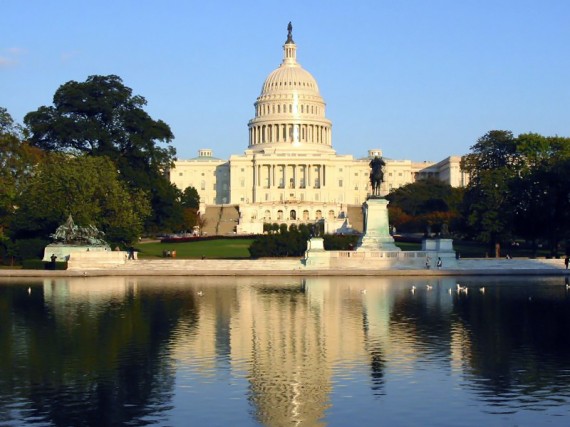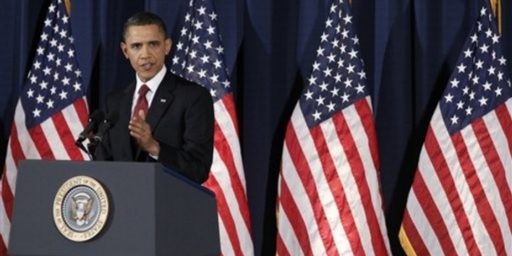House Refuses To Authorize Libyan War, Then Refuses To Defund Libyan War
Congress had a chance to send a strong message to the Executive Branch today. They failed.
Two seemingly contradictory votes by the House of Representatives today have left the entire debate over Presidential war powers and the role of Congress in that process:
The House delivered a surprising split decision on Libya Friday: Voting against authorizing the use of American forces there and then, an hour later, refusing to limit funding for the mission.
In essence, the House decided that it will neither endorse nor totally reject American intervention in Libya.
It appears that a last-minute White House lobbying effort to stave off Democratic defections worked — at least on the spending-limitation bill. Secretary of State Hillary Clinton asked House Democrats to back their president in a closed-door meeting in the Capitol Thursday, and National Security Adviser Tom Donilon summoned a small group of liberals to the Situation Room at 7 a..m. Friday morning for a classified briefing that may have influenced a handful of votes.
Still, the House rejection of a one-year authorization of the use of force in Libya earlier on Friday represented the most serious congressional challenge to the president’s war-making authority in more than a decade. It was a symbolic vote, but one that was felt on the other end of Pennsylvania Avenue.
“We are disappointed by that vote,” White House spokesman Jay Carney said between roll calls. “We think now is not the time to send the kind of mixed message that it sends when we are working with our allies to achieve the goals that we believe that are widely shared in Congress.”
And, he noted, the move won’t stop the U.S. involvement.
“This is one vote,” he said.
Earlier Friday, House rejected the one-year authorization of the use of force in Libya, written by Rep. Alcee Hastings (D-Fla.), on a 123-295 vote. GOP leaders allowed it to come to the floor so that they could demonstrate Obama does not have the support of the House for the mission — and they did just that. Eight Republicans and 115 Democrats voted for the use of force, while 225 Republicans and 70 Democrats were opposed.
But the funding-limitation bill, which would have allowed only for non-hostile American support of the NATO-led mission, also failed, 180-238, with the overwhelming majority of Democrats and several dozen Republicans voting “no.”
You’ve got to really take note of the Administration’s arrogance here. Despite the fact that the House of Representatives specifically refused to authorize military action in Libya, the President’s spokesman said that the United States was going to continue with military action in Libya. I can’t say I really blame them, though, because this comes down to just another example of the Congressional cowardice in this matters that I’ve written about before. The House of Representatives had the chance to send a strong, serious rebuke to the President on a military adventure that the public does not support, and which the President has arrogantly chosen not to consult Congress on oin the apparent belief that all he needs is the permission of the United Nations Security Council and NATO. Instead of doing that, though, they’ve once again sent mixed signals and basically said that the President can do whatever he wants.
It wasn’t a total loss, of course, because at least the issue got debated, and even some Democrats recognized the serious problems raised by the Administration’s refusal to consult with and seek authorization from Congress for the mission:
Rep. Jerrold Nadler (D-N.Y.) said Congress must act to limit funding for military operations in Libya in order to correct that trend.
“We have been sliding for 70 years to a situation where Congress has nothing to do with the decision about whether to go to war or not, and the president is becoming an absolute monarch,” Nadler said on the floor. “And we must put a stop to that right now, if we don’t want to become an empire instead of a republic.”
Nadler stressed that he is not talking exclusively about “this president,” meaning President Obama. But he said nonetheless that Congress needs to reassert its authority to declare war, and said this should be done even over concerns that it would damage U.S. credibility with its NATO allies.
“I think that the nation’s credibility, that is to say its promise to go to war as backed by the president, not by the Congress, ought to be damaged,” he said.
“And if foreign countries learn that they cannot depend on American military intervention unless Congress is aboard for the ride, good,” he added. “That’s a good thing.”
It would also be a good thing to the extent it cut back on the idea that the President is a quasi-Monarch with the power to commit American forces to war. or quasi-war, on little more than his or her own whim.
Nonetheless, though, I’m left with the impression that Congress has dropped the ball here and that they have proven Matthew Yglesias to have been absolutely correct when he wrote this:
For congress, it’s quite convenient to be able to duck these issues. Handling Libya this way means that those members of congress who want to go on cable and complain about the president’s conduct are free to do so, but those who don’t want to talk about Libya can say nothing or stay vague. Nobody’s forced to take a vote that may look bad in retrospect, and nobody in congress needs to take responsibility for the success or failure of the mission. If things work out well in Libya, John McCain will say he presciently urged the White House to act. If things work out poorly in Libya, McCain will say he consistently criticized the White House’s fecklessness. Nobody needs to face a binary “I endorse what Obama’s doing / I oppose what Obama’s doing” choice.
The refusal to authorize military action is largely symbolic, and Obama can and will ignore it for the toothless action that it is. Congress had a great opportunity to strike a blow against the Imperial Presidency today, and they failed miserably.







This was a vote TO FUND certain military actions in Libya. It failed; therefore, NO FUNDING HAS BEEN APPROVED. Just wanted to clear this up before everyone gets into a hissy fit about the failure of this bill.
STOP!
Before….
I say “STOP!”…..again.
But Obama’s been conducting the war (or whatever he’s calling it now) in Libya without official funding so far – he’s siphoning money off from somewhere else to finance it. There seems to be plenty of funny-money around, not at all surprising in anything as gross and bloated as the Federal budget. It’s not clear that Congress has any control over that bit of sleight-of-hand. If this is so, then a Congressional vote on funding is of little practical importance.
But with this vote, Congress has made it very clear that, no matter how he manages to pay for it, Obama’s Excellent Libyan Adventure is illegal. It’s not merely symbolic. Firing off munitions at Libyans in now a crime, not just questionable policy.
“full of sound and fury,
signifying nothing.”
tom
I’m an ironclad civil libertarian, but I have to say I understand the President’s lack of respect toward Congress. I’m sure there’s a very strong temptation to do whatever the hell he wants rather than defer to our latest batch of damnable officials.
I have a suspicion the administration is at a loss for what to do next. As americans so often do, the president and his advisors overestimated the efficacy of our military power, expecting the Libyan offensive to be over well before the sixty day limitation of the War Powers Act came into play. It would explain the pathetic and ill-thought excuse making coming fom the White House that this particular operation doesn’t fall under the purview of the act because it doesn’t, so shut up.
I don’t think his advisors even had a backup plan just in case Ghaddafi refused to die, so sure were they of killing him quickly. No matter how many times air power fails to deliver, the Washington crew just keeps on thinking of it as a panacea
Maybe we should de-fund congress.
You can’t fool me — this article is really from The Onion, right??
“I have a suspicion the administration is at a loss for what to do next. ” They were at a loss for what to do from the very beginning. But it’s hard to predict the future of Libya when the countries involved in the conflict are guided by their national interests. The positive outcome just before the presidential election is one of the reasons they are so reluctant to finish this war.
So the house might have done someting, but it looks like the administration correctly anticipated their inaction, and so in a harsh tactical sense, Obama earns “well played.”
He got funding without authorization.